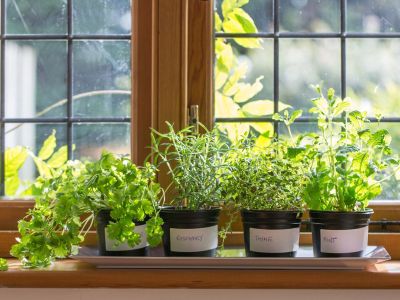Grow Herbs Indoors This Winter: Easy Guide

As the cold winter months approach, many of us bid farewell to our outdoor gardens. But did you know that you can bring a touch of summer indoors by growing herbs? Imagine the delight of fresh basil on your pasta or the aroma of rosemary wafting through your kitchen. Indoor herb cultivation is not only possible but also incredibly rewarding. Let’s dive into how to grow herbs indoors during winter with this easy guide.
Why Grow Herbs Indoors During Winter?
Growing herbs indoors during winter is more than just a hobby; it's a way to maintain a fresh supply of culinary delights and a touch of nature in your home. Indoor herb gardening tips can transform your kitchen into a miniature urban herb farm, providing you with fresh ingredients year-round.
Choosing the Right Herbs for Indoor Cultivation
Not all herbs are created equal when it comes to indoor plant care. Some herbs thrive indoors, while others prefer the great outdoors. Here are some of the best herbs for indoor cultivation:
- Basil: This versatile herb loves sunlight and warmth, making it perfect for a sunny windowsill.
- Parsley: A hardy herb that can tolerate lower light conditions, making it ideal for indoor growth.
- Rosemary: This fragrant herb prefers well-drained soil and plenty of sunlight.
- Thyme: A low-maintenance herb that thrives in bright, indirect light.
- Mint: This fast-growing herb can be invasive outdoors but is easily managed in pots indoors.
Setting Up Your Indoor Herb Garden
Choosing the Right Containers
The right container can make or break your indoor herb garden. Opt for pots with good drainage to prevent root rot. Terracotta pots are a popular choice due to their porous nature, which allows for better air circulation.
Soil Selection
The soil you choose is crucial for winter herb growth. A well-draining potting mix is ideal. Avoid using garden soil, as it can be too heavy and may contain pests or diseases.
Lighting Requirements
Light is the lifeblood of your herbs. Most herbs require at least 6-8 hours of sunlight per day. Place your herbs near a south-facing window for optimal light. If natural light is scarce, consider using grow lights to supplement.
Caring for Your Indoor Herbs
Watering Techniques
Overwatering is a common mistake in indoor herb gardening. Allow the soil to dry out between waterings. A good rule of thumb is to stick your finger about an inch into the soil; if it feels dry, it’s time to water.
Temperature and Humidity
Herbs generally prefer temperatures between 65-70°F (18-21°C). Maintain consistent humidity levels by misting your plants or placing a tray of water near them.
Fertilizing Tips
Herbs don’t require much fertilizer, but a light feeding every few weeks can boost growth. Use a balanced, water-soluble fertilizer diluted to half strength.
Troubleshooting Common Issues
Pests and Diseases
Indoor herbs can be susceptible to pests like aphids and spider mites. Regularly inspect your plants and treat any infestations promptly with insecticidal soap or neem oil.
Yellowing Leaves
Yellowing leaves can indicate overwatering or insufficient light. Adjust your watering schedule and ensure your herbs are getting enough sunlight.
Slow Growth
If your herbs are growing slowly, they may not be getting enough light or nutrients. Consider using grow lights and ensure you’re fertilizing appropriately.
Harvesting and Using Your Herbs
Harvesting your herbs is the rewarding part of indoor herb cultivation. Pinch off the top growth to encourage bushier growth and more leaves. Use your fresh herbs in cooking, teas, or even as garnishes.

Conclusion
Growing herbs indoors during winter is a delightful way to bring nature into your home and enhance your culinary adventures. With the right herbs, containers, soil, and care, you can enjoy a thriving indoor herb garden all winter long. So, why not give it a try? Your taste buds and your home will thank you.
FAQs
What are the best herbs to grow indoors during winter?
- Basil, parsley, rosemary, thyme, and mint are excellent choices for indoor cultivation.
How much light do indoor herbs need?
- Most herbs require at least 6-8 hours of sunlight per day. Place them near a south-facing window or use grow lights if natural light is insufficient.
How often should I water my indoor herbs?
- Water your herbs when the top inch of soil feels dry. Overwatering can lead to root rot, so be cautious.
What type of soil is best for indoor herbs?
- A well-draining potting mix is ideal for indoor herbs. Avoid using garden soil, as it can be too heavy and may contain pests or diseases.
How can I prevent pests on my indoor herbs?
- Regularly inspect your plants for signs of pests. Treat any infestations promptly with insecticidal soap or neem oil.

By following this guide, you’ll be well on your way to enjoying fresh herbs all winter long. Happy gardening!
0 Response to "Grow Herbs Indoors This Winter: Easy Guide"
Post a Comment